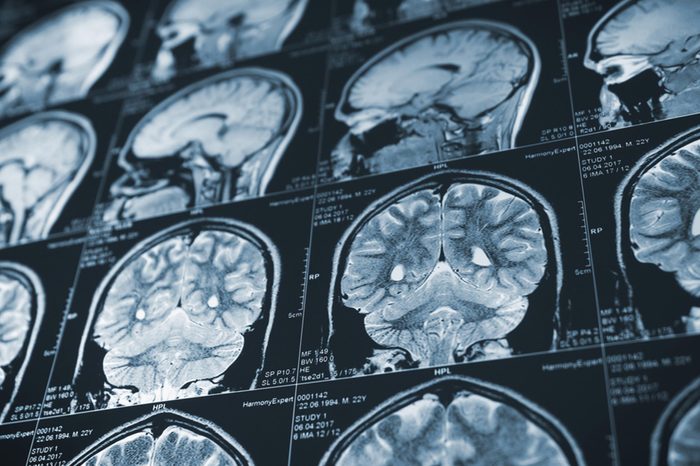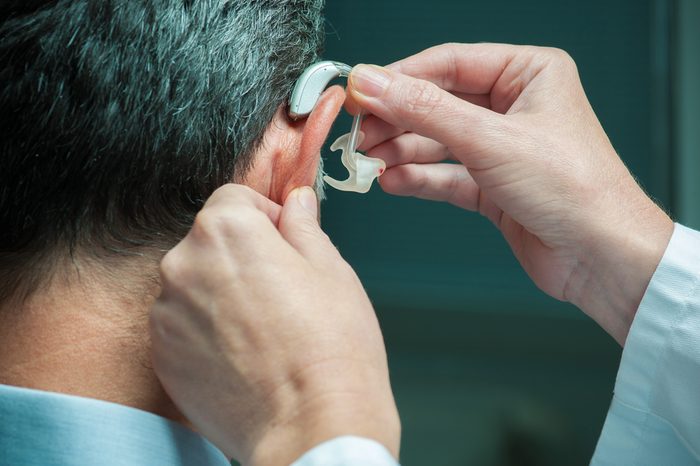
How do you keep your brain young?
A rich new area of science is analyzing which healthy habits best keep your mind and memory healthy in the 40s and beyond. Kenneth S. Kosik, MD, co-director of the Neuroscience Research Institute at the University of California, Santa Barbara, has studied which habits most powerfully boost our cognitive function. Here, he shares the most up-to-date research from innovative labs plus the best brain-boosting tips from his book Outsmarting Alzheimer’s.

Play games with your frontal lobe
Whether you’re deliberating a chess move or bluffing at cards, you’re also giving the frontal lobe, the area of your brain that handles executive function, a workout. “The frontal lobe is particularly vulnerable to degeneration and the effects of aging,” says Dr. Kosik. A study published in 2015 in Brain Imaging Behavior found that adults in middle age who routinely worked on puzzles and played board games had higher brain volume in the area responsible for cognitive functions, including memory, than those who didn’t play games.
(Did you know a jigsaw puzzle is also a great antidote for anxiety?)

Stay young with saa, taa, naa, and maa
Dharma Singh Khalsa, MD, president and medical director of the Alzheimer’s Research and Prevention Foundation and author of Brain Longevity, has spent many years studying the meditative tradition called Kirtan Kriya and has found that daily 12-minute sessions of the practice can improve blood flow to the brain and possibly even increase levels of telomerase, an enzyme that slows cell aging. The practise is simple: While breathing deeply, chant the Sanskrit words saa, taa, naa, maa (which mean “my divine self”) while moving your thumb to touch your index, middle, ring, and pinkie fingers with each new sound. Like any meditation, it may help to lift anxiety and fatigue.
(Keep in mind, this is how to make meditation a daily habit)

Protect your mind from your heart
Scientists surveyed volunteers about seven familiar heart-health factors and tested their cognitive performance at two points over eight years. The results, published in 2017 in the journal Stroke, found that the more heart-healthy habits people had, the less cognitive decline they showed. A stronger cardiovascular system means a stronger pipeline of nutrients to the brain, says lead author Hannah Gardener, ScD, an epidemiologist and assistant scientist in the Department of Neurology at the University of Miami. The seven heart-health ideals to strive for: Not smoking; maintaining a healthy BMI (body mass index); staying physically active (aim for at least 150 minutes per week); having healthy total cholesterol (under 200 mg/dL), blood pressure (under 120/80 mmHg), and blood sugar (under 100 mg/dL); and following an eating plan that’s rich in fruits, veggies, and whole grains, and low in sodium and sweets. They all may be familiar, if a little overwhelming, but “each one helps,” says Gardener.
(Related: 3 Stretches That Are Good For Your Heart)

Lift the quality of your white matter
As the brain ages, its white matter often develops small lesions because of disrupted blood flow, leading to impaired cognitive function and mobility. A study published in 2019 in the Journal of Applied Physiology suggests that strength training may help lessen cognitive decline. When study participants lifted weights, they got stronger, of course, but they also changed the cellular environment inside their brains, improving their ability to think. Key moves you can try at home (using soup cans for weight): biceps curls, triceps extensions, calf raises, mini squats, mini lunges, and lunge walks. Aim for 45 minutes a session.

Make moves directly against Alzheimer’s
Exercise benefits the brain by improving vascular health—but a study published in 2014 in Inflammation and Cell Signaling suggests it also combats the chronic neuroinflammation seen in Alzheimer’s, depression, and other brain diseases. In such neurological conditions, the inflammation that normally clears tissue damage doesn’t shut off and starts to interfere with communication between neurons. Exercise has proven anti-inflammatory effects against diseases like diabetes and rheumatoid arthritis, so that could be why exercise protects brain health as well, says assistant professor Jonathan Little, PhD, associate professor in the School of Health and Exercise Sciences at The University of British Columbia. “Any type of moderate-intensity exercise, such as walking, cycling, and swimming, can have anti-inflammatory effects,” says Dr. Little. Aim for about 30 minutes a day.
(Related: 11 Workout Moves You Can Do With Everyday Objects You Have at Home)

Get your blood pumping
Although any exercise is good, aerobic workouts may be the best for brain health. A study published in 2018 in the Journal of the American Geriatrics Society found that older adults at risk for or who already have Alzheimer’s, aerobic exercise may be more effective than other types of exercise in preserving the ability to think and make decisions. “Research shows that aerobic exercise increases blood flow in the hippocampus, the memory region of the brain,” says neuroscientist Sandra Bond Chapman, PhD, founder and chief director of the Center for BrainHealth at the University of Texas at Dallas. “This is also the area most affected by Alzheimer’s, so you are strengthening a vulnerable part of the brain.”
(Related: 7 Best Cardio Workouts You Can Do at Home)

Think deep thoughts
The brain relies on connections between neurons to function well, reports the National Institute on Aging. In Alzheimer’s, these connections begin to die off. Doing all you can now to help strengthen your neural connections will help protect your brain as you age. Use any opportunity in your daily routine for critical thought and analysis. “The strongest mental habit is to pursue deeper level thinking,” Dr. Chapman says. “This can happen in your everyday life, for instance abstracting themes from shows you see or books you read. Deeper-level thinking is like push-ups and sit-ups for the brain.” Joining a book club or even discussing your favourite episode of a TV show with your partner is an excellent place to start.
(Related: Here’s why reading is so important for your brain.)

Keep your mind working
Another way to keep those neurons strong is to encourage neuroplasticity, which is the brain’s ability to rewire itself and form new connections. Research, including a study published in 2015 in Neuroscience, shows that cognitive stimulation actually helps improve brain plasticity. Any new tasks you try can help keep your brain active, motivated, and inspired. “The brain is quickly jaded on routine and goes to auto-pilot when it gets bored,” Dr. Chapman says. “Doing new things—and improving things you’re already doing—can help your brain gain ground.”
(Here are some more habits proven to boost your brain health.)

Get brain circuits singing
Listening to or playing music can activate the motor cortex (touching a piano key or guitar string), the auditory cortex (hearing the notes you make), and the emotional center, or limbic system (feeling moved by a beautiful passage). “Circuits and networks are stimulated by these activities, which help keep the brain healthy,” says Dr. Kosik.
(Related: 21 Hidden Health Benefits Music Lovers Wish You Knew)

Try some acting
Learning lines for a production or an acting class engages the hippocampus, the temporal cortex, and the frontal lobe, says Dr. Kosik. In one seminal study published in Neuropsychology, Development, and Cognition, people who went to acting classes twice a week for four weeks boosted their ability to remember words, numbers, and short stories. A 2013 study published in Experimental Aging Research found that acting classes helped improve word fluency by 12 percent and word recall by 19 percent.
(Relayed: 17 Memory Strategies You’ll Never Forget)

Draw out your neural connections
When you draw, paint, or sculpt, you have to make spatial calculations and focus attention on details, Dr. Kosik says. Engaging in these activities helps protect octogenarians from mild cognitive impairment, according to a study published in 2015 in Neurology.
(Related: Do Brain Games Actually Work?)

MIND your eating habits
A study published in 2015 in the journal Alzheimer’s & Dementia found that combining elements of the Mediterranean diet and the heart-healthy DASH (Dietary Approaches to Stop Hypertension) diet is good for your brain. Following the MIND diet (short, for Mediterranean-DASH Intervention for Neurodegenerative Delay) was found to reduce the risk of Alzheimer’s up to 50 percent. “The food you eat provides the fuel for your brain, and the MIND diet produces the best kind of fuel,” Dr. Chapman says. “It includes such things as whole grains, leafy green vegetables, nuts, fish, berries, olive oil, beans, as well as limited amounts of cheese, wine, and dark chocolate.”
(Also, these are the top brain-enhancing supplements to add to your diet.)

Skip the fat
There has been debate over the role of dietary fat in Alzheimer’s. According to Dr. Chapman, “Fried foods and foods high in saturated fat should be avoided.” We already know these foods aren’t good for your health in general, so that’s another good reason to give them a pass. A high-fat diet can also cause weight gain, which is a risk factor for diabetes—and diabetes, in turn, is a risk factor for Alzheimer’s. Although scientists aren’t sure exactly how diabetes and Alzheimer’s are linked, the Alzheimer’s Association suggests diabetes damages blood vessels in the brain, alters brain chemistry, and contributes to inflammation that harms brain cells.
(Learn more on what a high-fat diet can do your brain.)

Take a probiotic
Scientists are just beginning to understand how the collection of good bacteria in your GI tract, known as the gut microbiome, influences your brain. “Feedback signals from the gut tell the brain about gastric and intestinal motility, gut hormone secretion, and gut inflammation,” says Linda Rinaman, PhD, a professor of psychology and neuroscience at Florida State University who’s studied the gut-brain connection. Much of the research on the “gut-brain axis” in relation to the development of Alzheimer’s has been observed in rodents. But new studies in humans, including one published in 2017 in Scientific Reports, are also revealing a connection between the type of bacteria in the gut and the likelihood of Alzheimer’s. Although probiotics, which aim to balance your gut bacteria, haven’t yet been proven to protect brain health, it may be worth giving them a try—or eating probiotic-rich foods like yogurt or sauerkraut.

Get your sleep on
You know what a bad night’s sleep can do to your focus the next day. Over the years, regular sleep deprivation can raise your risk of dementia, suggests a study published in 2018 in Proceedings of the National Academy of Sciences. “During sleep, your brain literally cleans out some of the toxicity that has built up from stress or agitation,” Dr. Chapman says. “Without good sleep, we see increased anxiety and stress. Sleep is restorative, helping you be more mentally energetic and productive. Even a quick nap helps.” Just keep daytime snoozing to about an hour, as longer than an hour and a half may be detrimental to your noggin, according to a study published in 2016 in the Journal of the American Geriatrics Society.
(Not sleeping well? These before-bed habits may be keeping you from getting a good night’s sleep.)

Accentuate the positive
Doctors have long known there’s a connection between depression and Alzheimer’s. Now, research, including a study published in 2015 in the Journal of Alzheimer’s Disease, suggests that depression is actually a risk factor for the disease. In addition, stress and stress hormones in the brain have also been linked with dementia. On the other hand, a study published in 2018 in PLOS One found that a positive attitude about aging is actually associated with a lesser chance of developing dementia, even in the presence of other risk factors. If you’re depressed, it’s best to get help now. “Positivity always helps, but it’s just as important to embrace mistakes to learn from them and not be stuck,” Dr. Chapman says.
(Related: 5 Olympian-Worthy Coping Strategies to Use During the Pandemic)

Make new friends, and keep old ones
Socializing and maintaining friendships can protect against cognitive decline. “One of the most powerful things for brain health is relating to others—a shared sense of community is one of the top three factors associated with brain health as we age,” Dr. Chapman says. “Socialization also requires some of the most complex cognition because it requires us to constantly negotiate an understanding with those around us. For the brain, it’s like constantly solving a puzzle.” Keep in mind: It’s not the number of friends you have, she says, but rather the quality and depth of your connections.
(Related: How to Keep Your ‘Big Friendships’ Alive, Especially During a Pandemic)

Don’t multitask
Trying to focus on several things at once puts a strain on the brain and it negatively impacts memory, especially as we age, according to research, including a study published in 2014 in PLOS One. “Multitasking is as toxic to the brain as cigarette smoking is to the lungs, but the effects become apparent much more quickly,” Dr. Chapman says. “Multitasking, which is really the brain constantly switching between tasks, decreases memory function and reduces hippocampus size. It fatigues the system and breaks down your immune system.” All of these things combined make avoiding multitasking the number one thing people should do to maintain and enhance their brain health, she says.
(Related: 30 Amazing Facts About Your Brain That Will Blow Your Mind)

Skip sugar
Research has found a high-carb diet loaded with added sugars can muddy your thinking and your memory. You don’t have to have diabetes to have the kind of high blood sugar levels that can speed your brain’s cognitive decline, suggests several studies, including one published in 2018 in Diabetologia. “Although the brain relies on sugar for its main source of energy, too much sugar flooding into the brain at once from a high-sugar diet can overload the brain and cause negative effects such as lapses in concentration, learning, and even advanced aging of the cells,” says Erin Palinski-Wade, RD, CDCES, a registered dietitian, certified diabetes care and education specialist, and author of 2 Day Diabetes Diet. “By eating a diet low in added sugars, you can help to prevent spikes in blood glucose levels that may cause these damaging effects while making sure the brain still gets the energy it needs to function at its peak.”
(Related: Here’s how to train your brain to hate junk food.)

Limit alcohol
A study published in 2018 in The Lancet suggests that having more than three drinks a day for women or four for men substantially raises the risk for dementia, and particularly early-onset dementia. “Drinking excessive amounts of alcohol can have a negative impact on the brain—another study (published in 2014 in Neurology) found excessive drinking may accelerate memory loss as we age,” Palinski-Wade says. The jury is still out on moderate drinking: Although a study published in 2017 in BMJ suggests it may be detrimental for your brain, the harm might be balanced by its heart benefits. If you do drink alcohol, stick to the recommended one drink a day for women, two for men.
(Related: Meet Acid League, The Canadian Company Making Alcohol-Free Wines Even Wine Geeks Will Love)

Load up on fruits and veggies
You can get antioxidant compounds called flavonoids in most brightly coloured fruits and vegetables—and they can help keep your brain healthy. “Antioxidants fight against damage to cells caused by free radicals,” says Palinski-Wade. “When free radicals are present, they can harm cells, including brain cells, causing premature aging and raising your risk of disease. A high level of antioxidants in your diet can help fight against free radical damage and offer protective benefits to cells.”
(Related: 5 Budget-Friendly Vegetables That Are a Great Source of Fibre)

Spice it up
Curcumin, present in the curry spice turmeric, may have some antioxidant properties as well. A study published in 2014 in Applied Physiology, Nutrition, and Metabolism found that the compound curcumin in turmeric can increase brain levels of brain-derived neurotrophic factor (BDNF), a growth hormone. “Since diseases such as depression and Alzheimer’s disease have been linked to declining levels of BDNF, experts theorize that increasing levels this hormone may fight against these diseases of the brain,” Palinski-Wade says.
(Related: 11 Amazing Benefits of Turmeric That May Just Change Your Beauty Routine)

Drink coffee
Researchers have found that coffee appears to be a boon to brain health, according to a study published in 2014 in The Journal of Nutrition. “The brain benefits from coffee come mainly from caffeine, which stimulates the central nervous system,” says Palinski-Wade. “In moderate amounts, caffeine can enhance focus and concentration. Caffeine may also boost short-term memory.” Plus, antioxidants in coffee may help protect brain cells, she says. Just don’t overdo the java: “Excessive levels of caffeine can suppress the release of serotonin in the brain” over time, which messes with sleep, another important part of brain health, warns Palinski-Wade. “Aim to keep your overall caffeine intake to less than 400 mg [about four cups] per day,” Palinski-Wade says.

Protect your noggin from bumps
Wearing a helmet when bike riding isn’t just to save your life—it’s actually important for your long-term brain health as well. The Alzheimer’s Association notes that head trauma is strongly linked with Alzheimer’s risk, and the earlier in life the injury occurs, the greater the chance of dementia later on. Wear a helmet when playing sports, a seat belt when driving, and take measures to prevent falls in your home such as installing non-skid carpets, railings on stairs, and keeping clutter and wires out of trafficked areas.
(Related: Expert Tips on How to Buy a Bike Helmet)

Protect your hearing
Hearing loss can have a negative impact on your brain: A study published in 2019 in Auris, Nasus, Larynx suggests a link between hearing loss and cognitive decline. Doctors don’t know exactly why, but it could have something to do with hearing keeping your brain active; social isolation (a risk factor for Alzheimer’s) caused by hearing loss could also be a factor. But the good news is that those who are treated for hearing loss, such as with hearing aids, may be able to improve their cognitive abilities, as a study published in 2018 in The Journals of Gerontology found.
(Related: Sanjay Gupta Has Good News for Your Brain)

Use headphones
While the idea that cellphone related emissions could harm your brain seems highly unlikely, it may be decades before we learn the true impact of radiofrequency energy on the mind, says the National Cancer Institute. Experts advise staying on the safe side by using speakerphones or headphones. In 2017, the California department of health issued guidelines warning people to avoid putting phones next to their heads. Just keep the volume down to help protect your hearing.
(Related: 9 Important Things Your Brain Fog Is Trying to Tell You)

Go dancing
You’ve heard that exercise is good for your brain; you may also know that music is good for your brain. Then there’s the fact that socializing keeps your mind healthy. Put them all together and what do you get? Dancing! A landmark study in the New England Journal of Medicine found dancing to be one of the top leisure activities that can help reduce the risk of dementia. Recent research published in 2017 in Frontiers in Human Neuroscience backs this up: Regular dancers had fewer signs of aging in the brain. Dancing can also improve mood, which benefits the mind; learning and memorizing dance routines also present a healthy challenge to your thinking process.

Become bilingual
A number of large-scale studies have reported no definitive connection between knowing a second language and a later onset of Alzheimer’s and dementia. However, a study published in 2014 in Annals of Neurology suggests that speaking a second language may protect against dementia.
(Related: The Awesome Health Benefits of Awe Walking)

Get schooled
One reason learning a language might help save your brain is that more education can reduce the risk of Alzheimer’s, according to a study published in 2017 in The BMJ. And, it’s never too late to sign up for classes. Higher education leads to the development of new neurons and neural connections in the brain that can make up for age-related cognitive losses, according to a report published in a 2018 issue of Nature.
(Related: 6 Happiness Books that Mental Health Experts Trust)

Try out CBT
A study published in 2017 in Behavioural Brain Research suggests that a type of talk therapy called cognitive behavioural therapy (CBT) may help prevent Alzheimer’s. How so? CBT can ease depression and improve sleep—two risk factors for dementia. With CBT, you learn how to redirect your brain away from negative or distracting thoughts.
(Related: Is Your Therapy Working? 9 Signs Your Therapist Is Helping You)

Get a pet
In the same vein of “what’s good for your heart is good for your brain,” dogs can help heal your mind. Having a canine companion can reduce cardiovascular risk, suggests a study published in 2017 in Scientific Reports. Why? Probably because that dog is going to need walks. “I walk my dogs two times a day for a total of two to three miles,” says Aaron Ritter, MD, a neuropsychiatrist at the Cleveland Clinic Lou Ruvo Center for Brain Health in Las Vegas. “Having eager and dependent exercise partners ensures that I cannot skip days. The exercise and meaningful companionship help keep me happy and healthy.”
(Also, discover the benefits of walking for just 15 minutes.)

Go outside
Here’s another way Fido can help your brain—by getting you outdoors. A study published in 2015 in Landscape and Urban Planning shows that being in nature has a positive effect on cognitive function. Anyone who’s ever felt the need to “clear their head” can attest to the power of the outdoors in recharging thinking.
(Read more on how nature can boost your health.)

Laugh more
Laughter really is the best medicine when it comes to your brain health. The act of laughing lowers stress hormones while boosting your mood. In a study of older adults, published in 2014 in Advances in Mind-Body Medicine, viewing a funny video boosted scores on memory tests while lowering levels of stress hormones.
(Related: 25 Comedies on Netflix Canada to Watch When You Need a Laugh)

Take up knitting
The meditative motion, the gentle clicking of needles, the relaxing knitting circles—it’s no wonder this craft is a stress-relieving hobby. And a study published in 2014 in Psychological Science has actually shown that engaging in crafts such as knitting or quilting can reduce the chance of developing mild cognitive impairment—by as much as 28 percent, according to a study published in 2017 in JAMA Neurology.
(On the other hand, find out the habits you never knew were aging your brain.)

Go online
Using a computer was even more effective than crafting in reducing the risk of dementia risk, according to the 2017 JAMA Neurology study. Although the authors couldn’t say exactly why, they theorize that computers “require specific technical and manual skills and that these could be the factors that might be associated with a decreased risk of cognitive decline.”
(Related: This Treatment Could Prevent the Tension Headache You Get From Staring at the Computer All Day)

Think quality, not quantity
Be wary of information overload on the internet: Trying to comprehend it all is just like multitasking—the brain can’t figure out what’s important. A study published in 2019 in World Psychiatry found that high-levels of internet use has a negative impact on the brain. The never-ending stream of prompts and notifications encourages us to constantly divide our attention. Then, in turn, may reduce our capacity for maintaining concentration on a single task.
(Related: 3 Changes to Your Diet That Could Benefit Your Brain)

One good habit is not enough
Perhaps the best advice for brain health is that you can’t latch onto one thing and expect it to protect you from cognitive decline. A study published in 2015 in The Lancet suggests that a comprehensive program giving patients guidance on everything from diet and exercise to brain training and the management of metabolic risk factors could better prevent cognitive decline. Compared to people in the control group (who lived life as they normally would), the intervention group scored 83 percent higher on tests of critical thinking, and they could problem solve 150 percent faster.
(Related: 30 Healthy Habits to Adopt Now, According to Every Type of Doctor)

Keep your body healthy to save your mind
A healthy lifestyle will protect your brain, so get regular checkups and treat any issues. For example, you may need to take medicine for blood pressure or cholesterol, get help for sleep apnea, or keep diabetes well managed. Research published in 2016 in Annals of the New York Academy of Sciences shows how personalized prevention plans can help with your current medical issues and your future brain health. Bottom line: There is no one-size-fits-all approach.
Next, this is how mindfulness can ward off stress and anxiety.
